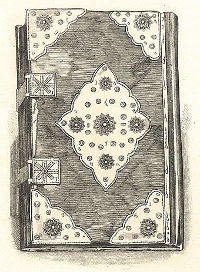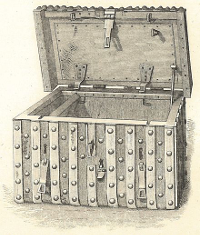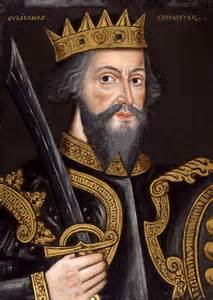Domesday Book
William of Normandy invaded England, defeated King Harold at the Battle of Hastings, and became England's King William I. What then to do?
William had been to England before, but he hadn't been all around the country, so he didn't know exactly what he was king of; he decided to take a survey and sent out a large group of survey officials to compile a large amount of information about the people he was now ruling: how much land they had and what was on that land. The result was Domesday Book, and it is one of the most famous publications in all of English history. William didn't order this survey right away. The Battle of Hastings occurred in 1066. William settled in for a time, then ordered the survey. Some historical sources disagree as to the year in which the survey was conducted: some say 1085, and some say 1086. The information was eventually compiled into published form and eventually became a book, but it began as a collection of information, intended to give the king guidance on how much he could justify taxing his subjects. It took only a year to complete. 
England in those days was a collection of manors and farms and towns and villages and shires (or counties). William's surveyors asked a series of questions, such as these:
Norman survey officials would go to each individual manor or farm and ask these questions, then go to the reeve, a type of regional manager, and ask the same questions; the punishment for giving the surveyors false information was severe. (The title shire reeve became corrupted down through the years and became sheriff.) 
Survey officials visited more than 13,400 places in all. One well-known primary source from the time wrote this: "So very thoroughly did William have the enquiry carried out, that there was not a single piece of land, not even an ox, cow or pig which escaped the notice of the survey." The one caveat to that was that some significant places were not included–Bristol, London, Northumberland, Winchester, and much of the northwest among them–because many of these places were tax-exempt. The result, as King William saw it, was an invitation to tax. If every one of his subjects was using their money to pay taxes to the crown, then they couldn't very well finance a private army to oppose the king. At the same time, the king could use that income to build up his own royal army. Although King Harold had defeated a large Scandinavian force earlier in 1066, William still worried about another one, since the Danes especially but also other Scandinavian people had been making a habit of invading England for several hundred years and were making rumbles anew in the 1080s. So another purpose of Domesday Book was to ascertain how many weapons and men to wield them the king could count on in a fight. William didn't live very long after the completion of Domesday Book. He died in 1087 and was succeeded by his son, who became King William II (also known as William Rufus). Domesday Book is actually a collection of two books: Great Domesday and Little Domesday. The one was called Great because it had larger pages when published; the other was called Little because it had smaller pages when published. Little Domesday actually had more pages than Great Domesday. Domesday Book was originally called "the Book of the Exchequer" or "the Great Book of Winchester" (since it was completed there). The term Domesday was applied later. Domesday was pronounced "dooms-day." Historians have various theories as to the origin of the term. One theory is that it was a reference to the word "doom," which meant law. Another theory is that the requirement to pay tax according to what was in the book was a person's doom, something that couldn't be avoided (a possible reference to the Christian Bible's idea of Judgement Day, when a person would have to own up to certain things). 
Poor people (who were numerous) didn't pay taxes, of course, and so weren't much affected by the survey. Other facts about Domesday Book:
|
|
Social Studies for Kids
copyright 2002–2026
David White





